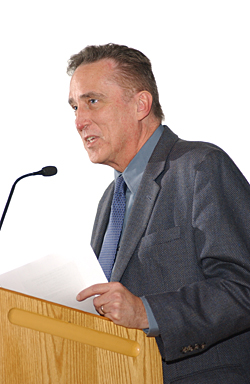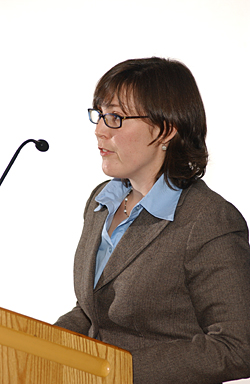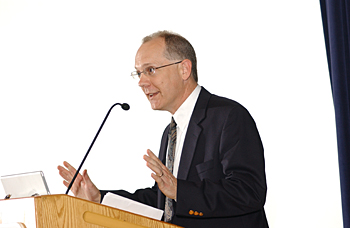
“We plan on making this an annual event,” Thomas Apple, dean of the College of Arts and Sciences and professor of chemistry and biochemistry, said in his opening remarks. “It's a superb idea that brings people together to talk about these wonderful awards.”
Byrne said that the Nobel Peace Prize was traditionally awarded for achievements in four main categories--efforts to build a culture of peace, efforts to end armed conflict, compassionate action in the face of cruelty, and to those who braved violence to advance human rights and dignity--but Gore and IPCC fall under a relatively new category that awards efforts to build a peaceful relation between society and nature. Previous recipients in this category are Wangari Maathai and the Green Belt Movement of Kenya in 2004 and Muhammad Yunus and Grameen Bank of Bangladesh in 2006.
To underline the importance of IPCC's work, Byrne quoted Maathai: “Climate change is the single biggest threat to word peace we have ever faced.”

“The U.S. is the most carbon-intensive civilization,” said Byrne, who pointed out that the amount of carbon emissions for every American person is the same amount produced for every 15 people in India. “Unless we address the per capita rate, there is no way that other countries are going to reduce their carbon emissions.... There is no way we can reach the 3.3 ton [annual carbon emission per capita] goal unless we dramatically change the amount of energy we use every day.”
Byrne said carbon emissions can be drastically reduced through measures and guidelines that were recommended by the state of Delaware's Sustainable Energy Utility (SEU) Task Force, of which he was cochair, in a report available at [www.seu-de.org]. SEU, a sustainable energy utility, was established by law in Delaware on June 28. The legislation establishes a state-supervised nonprofit organization dedicated to helping residents and businesses of the First State conserve energy and expand reliance on renewable energy sources through funds initially seeded by a $30 million bond.
Other speakers at the symposium were: Brian Hanson, chairperson and professor of geography, who highlighted the scientists whose work in the area of climate change gradually created a foundation for the award given to Gore and IPCC; Emily Davis, assistant professor of English, who discussed the works of Doris Lessing, winner of the 2007 Nobel Prize for Literature; and Michael Arnold, associate professor of economics, who discussed mechanism design theory, for which Lenid Hurwicz, Eric S. Maskin and Roger B. Meyerson won the 2007 Nobel Prize for Economics.

Article by Martin Mbugua
Photos by Duane Perry

